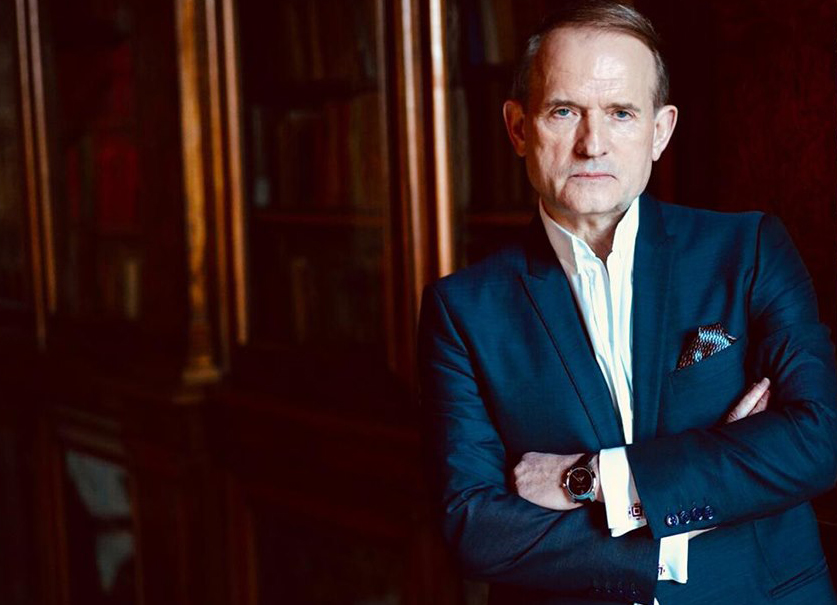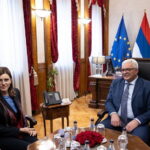The “Other Ukraine” movement, created by a disgraced Ukrainian ex-politician Viktor Medvedchuk, widely known as Russian President Vladimir Putin’s former top political ally in Ukraine, launched active work in Serbia, and even got his loyal MP into parliament. But why would someone whom Ukraine accuses of high treason have any interest in the Balkans?
We will try to answer this and other questions in this article.
Who is this Putin ally?
Viktor Medvedchuk has grown quite infamous in Ukrainian politics.
A lawyer by education, he had once gained notoriety for his disgraceful defense of the Ukrainian dissident poet Vasyl Stus in Soviet court who bowed down to prosecutors, recognizing the poet’s guilt although Stus plead not guilty, which effectively put Stus behind bars for a term of 10 years in a prison camp and another five years in exile. Stus never made it out of prison where he eventually died.
After Ukraine regained independence in 1991, Viktor Medvedchuk emerged on the political scene, once even becoming a deputy chairman of the Ukrainian parliament. It should be noted when Medvedchuk’s daughter Daryna was baptized in 2004, Vladimir Putin became her godfather.
In the early 2000s, Viktor Medvedchuk served as a “gray cardinal” for then-President Leonid Kuchma, heading his administration. It was in this position that he confronted the “Orange Revolution” in November 2004 – a mass protest in Kyiv’s Independence Square (widely known as the “Maidan”, hence the well-known definition of Ukrainian protests). People took to the streets over gross election fraud during the presidential vote. Peaceful protest that lasted nearly a month ended with a compromise. The government agreed to a repeat vote, the so-called the “third round” of the presidential election. This time it was not a pro-Russian Viktor Yanukovych who celebrated the win but a pro-Western Viktor Yushchenko. Instead, the opposition pushed through the constitutional reform (some say authored by Medvedchuk), which curbed presidential powers.
Despite the defeat of his political force as a result of the “Orange Maidan”, Viktor Medvedchuk retained an active role in Ukrainian political life and never left the big stage even after Russia unleashed the initial invasion of Ukraine in 2014. Moreover, along with his team, Medvedchuk participated on behalf of Ukraine in various Ukrainian-Russian negotiation formats. Until 2018, Medvedchuk had been a member of the Trilateral Contact Group, which dealt with humanitarian issues.
But as a full-scale invasion was looming, relations between Putin’s crony and Ukrainian authorities shattered. A probe was launched against Medvedchuk, who was charged with encroachment on Ukraine’s territorial integrity, embezzlement, spying for Russia, and aiding a terrorist organization.
After the outbreak of full-scale war in 2022, Medvedchuk tried to stay low and organize his own escape from country before he was apprehended. One version of Russia’s initial war scenario claimed the Kremlin’s blitzkrieg against Ukraine envisaged Medvedchuk’s appointment as chief of Russia’s occupation administration.
«Ukraine in exile» or «Other Russia»?
On September 21, 2022, Ukraine handed Viktor Medvedchuk over to Russia as part of a prisoner swap. Thus, he escaped trial along with 56 Russian POWs, for which Ukraine got 215 of its servicemen back from Russian captivity.
Medvedchuk quickly adapted to his political exile, and just months into moving to Russia, he founded the “Other Ukraine” organization. Its actual goal, which is clearly visible from statements and actions, is the unification of pro-Russian Ukrainians (or ex-citizens, like Medvedchuk himself, who was stripped of his Ukrainian passport in 2023) mainly outside of Ukraine. In the future, it is obvious that the plan is to form a socio-political movement based on this community, which could play the role of an “opposition”, which will take an openly anti-Ukrainian stance in support of Russian aggression.
Within Ukraine, creating such a force would be an impossible endeavor as it would be perceived as “Stockholm syndrome” or “treason”. Whereas in Russia, such activity looks quite natural – as yet another hybrid element of Russia’s aggression against Ukraine.
The Balkan direction
However, as it turned out, Medvedchuk’s movement never intended to be limited to operating within Russia’s borders.
In August 2023, its representative office was launched in Serbia and Dragan Stanojevic took the helm.
He is a fairly widely known pro-Russian figure with a long political history. For some time, his place of actual residence was in Ukraine, but currently Stanojevic is not there because he has been targeted by Ukrainian sanctions due to supporting Russia.
Serbian media claim that Stanojevic’s cooperation with Medvedchuk had started tears ago, back in Ukraine. Therefore, him resurfacing as Medvedchuk’s confidant in the project comes as no surprise. However, the question remains: What does “Other Ukraine” have to do with Serbia?
The answer may be this: the development of Medvedchuk’s movement involves activities not only in Russia, but also in other countries, primarily ruled by pro-Russian governments.
This version has the right to life as such a step may seem quite appropriate from the point of view of Other Ukraine’s objectives.
It is no secret that there is a significant number of Ukrainian citizens who fled their home country for Europe after the invasion of February 24, 2022, including for Serbia and neighboring countries, primarily Montenegro. Among them are residents of Crimea, Donbas, and other regions of Ukraine that are or were under Russian occupation. A significant part of these displaced Ukrainians either kept or were able to restore their Ukrainian passports, because holding one gives them advantages in obtaining government assistance in European countries. According to unverified reports, not all of this contingent are patriots of Ukraine – there are Russia sympathizers or even hardcore Putin fans among them. Some of those are staying in the European Union member states, too.
These people are an important human resource for Other Ukraine. So the organization is well aware of this and is going to actively engage those people from its Belgrade HQ.
Here is what Stanojevic said about it in a recent interview:
“Many Ukrainians are against their government. Some moved to Serbia, some to Russia, and some to the European Union. There are many who stand against their government. These people turn to me for help, legal advice, and with residence permit issues. But they ask not to make public anything we discuss because they are afraid of their government.
I wish there were a new platform that could unite people more than an individual politician.”
Here we could wrap up the analysis of Other Ukraine representation’s objectives but there is one caveat.
Other Ukraine and its leader are clearly not going to limit themselves to the Ukraine issue and have already made a serious claim to active participation in Serbia’s domestic political life.
So is it “Other Ukraine” or “Other Serbia”?
In the latest parliamentary elections, Dragan Stanojevic was on Branimir Nestorovic’s “We are the Voice of the People” list and will now receive a parliamentary mandate. Thus, Stanojevic, as one of the bloc’s leaders, will exploit a respectable platform while Medvedchuk’s organization will gain an official representation at the state level in Serbia.
During the campaign and immediately after the vote, Stanojevic, of course, mentioned the “Other Ukraine”, but the main topics of his public statements related to Serbian politics – both foreign and domestic. Some of them are relevant precisely in the context of the Russo-Ukrainian war, such as the one of introducing sanctions against Russia (Stanojevic is, of course, categorically against those). But most of his statements concern the current political life in Serbia and issues that concern Serbs in particular. These are, first of all, post-election protests, Kosovo, and European integration.
It’s not only the representation’s chief but also the organization itself who is vocal about the situation of Serbia, regularly publishing comments on political developments in the country.
This is what the head of the Movement’s Board, Viktor Medvedchuk, said about the rallies against alleged election violations:
“Today’s events in Serbia are a classic ‘color revolution’, involving Nazis masquerading as democrats and political criminals claiming to bring order.”
Here is what he said about Serbia’s European integration:
“… the question why join the European Union if the country’s leaders will be appointed from there, regardless of public opinion remains open. Today, the European Union is following NATO’s suit, which had without any reason bombed Yugoslavia and dismembered it. And it is clear that the movement toward the EU is a movement toward further dismemberment of Serbia and the elimination of Serbs as a nation.”
And here is the comment posted on the Other Ukraine website regarding the prospects for resolving the Kosovo issue:
“Many experts point out that time is now working for Belgrade, and as the global world is collapsing and the United States’ presence in Europe is being reduced, in a few years Serbia may get the opportunity to regain Kosovo quite painlessly.
It can be assumed that in a situation where the USA will be too busy with other matters, no one in Europe will dare fight with Belgrade without Washington’s support. Then the motivated Serbian army will execute the long-awaited order, and Albania will face a humanitarian disaster as a million-strong wave of refugees will flow from an unrecognized state.”
In fact, we are talking about an already designed narrative about the Other Serbia, a Serbia that does not join the EU; Serbia, which unleashes a war by forcefully taking back Kosovo; Serbia, which is a vassal of Russia – because, according to Medvedchuk, “if you remove the cultural and historical ties between the Serbian and Russian people, then Serbia will cease to exist in its national sense.”
“Ukrainian scenario” for Serbia
Statements about Serbia made by the Medvedchuk movement are actively circulated by Russian propaganda media in the Serbian language. (This fact, by the way, assumes that the Serbian direction in the operations of Other Ukraine is not an independent effort, and that it is backed by the Kremlin). After the organization gained access to the Serbian parliament through their man with the mandate it has even more opportunities to promote not so much Other Ukraine but rather Other Serbia.
It is unclear whether Medvedchuk’s organization was initially tasked by the Kremlin, or it came up with an initiative that was later approved in Moscow, but the real fact is that Other Ukraine is currently actively working in the Serbian direction, and apparently, going to expand its operations in the Balkans.
Late December 2023, the Embassy of Ukraine in Belgrade filed an official protest with Serbia’s Ministry of Foreign Affairs, requesting that the government terminate operations of Other Ukraine’s representation. However, no formal statements followed from officials in Belgrade that would in any way condemn the organization’s activities.
At the same time, the situation looks quite threatening precisely for the Serbian government headed by Aleksandar Vučić. It is obvious that for Moscow, today’s Belgrade is too pro-Western and not enough pro-Russian, too indecisive on the issue of Kosovo, and a bit too pro-active on its path toward the EU. In the near future, we can expect the strengthening of pro-Russian, anti-Western, anti-European, and confrontational rhetoric regarding Kosovo by Medvedchuk and his team to exert political pressure on Vučić and to agitate the Serbs. In fact, the construction of Other Serbia has already been launched, right by the Kremlin’s guidebooks (or direct instructions), and the only question is how far will Belgrade allow Moscow to proceed in repeating the “Ukrainian scenario”.



